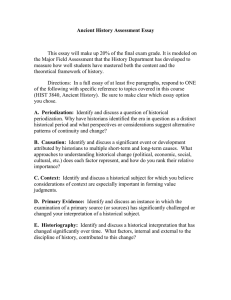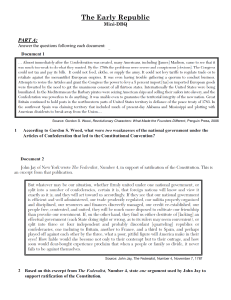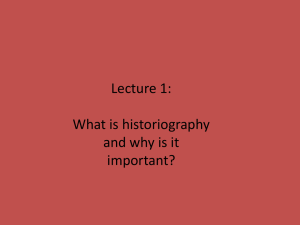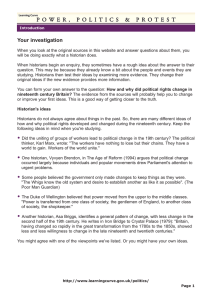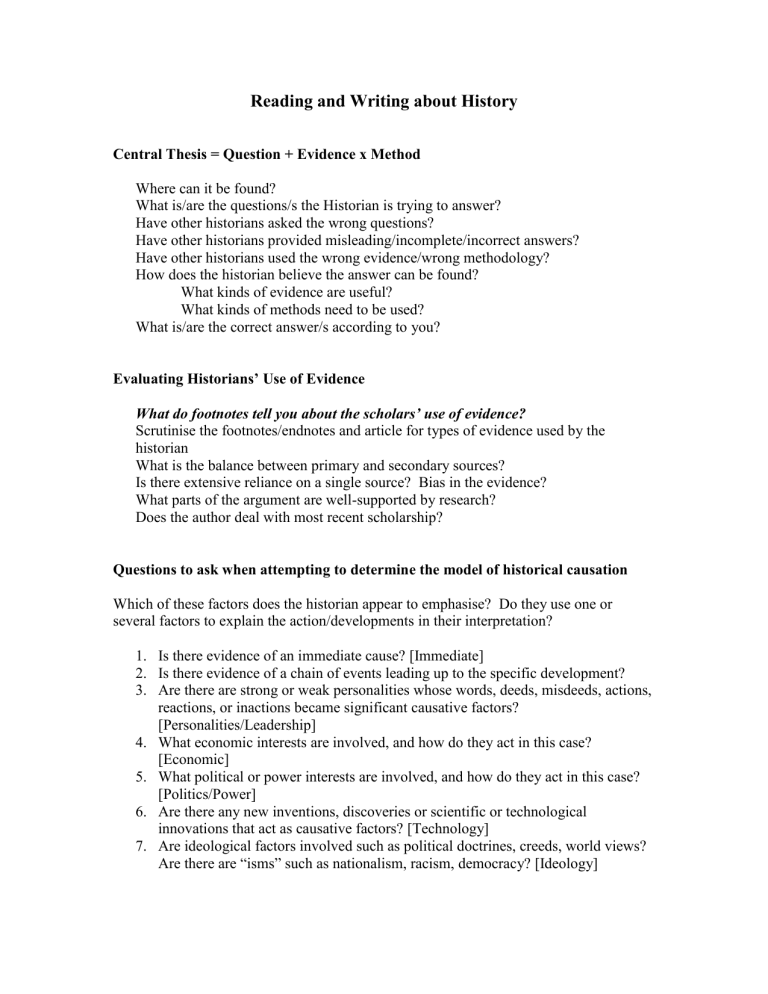
Reading and Writing about History Central Thesis = Question + Evidence x Method Where can it be found? What is/are the questions/s the Historian is trying to answer? Have other historians asked the wrong questions? Have other historians provided misleading/incomplete/incorrect answers? Have other historians used the wrong evidence/wrong methodology? How does the historian believe the answer can be found? What kinds of evidence are useful? What kinds of methods need to be used? What is/are the correct answer/s according to you? Evaluating Historians’ Use of Evidence What do footnotes tell you about the scholars’ use of evidence? Scrutinise the footnotes/endnotes and article for types of evidence used by the historian What is the balance between primary and secondary sources? Is there extensive reliance on a single source? Bias in the evidence? What parts of the argument are well-supported by research? Does the author deal with most recent scholarship? Questions to ask when attempting to determine the model of historical causation Which of these factors does the historian appear to emphasise? Do they use one or several factors to explain the action/developments in their interpretation? 1. Is there evidence of an immediate cause? [Immediate] 2. Is there evidence of a chain of events leading up to the specific development? 3. Are there are strong or weak personalities whose words, deeds, misdeeds, actions, reactions, or inactions became significant causative factors? [Personalities/Leadership] 4. What economic interests are involved, and how do they act in this case? [Economic] 5. What political or power interests are involved, and how do they act in this case? [Politics/Power] 6. Are there any new inventions, discoveries or scientific or technological innovations that act as causative factors? [Technology] 7. Are ideological factors involved such as political doctrines, creeds, world views? Are there are “isms” such as nationalism, racism, democracy? [Ideology] 8. Are there any cultural factors involved such as differences of religion, language or moral values? [Culture] 9. Is there any evidence of social tension, conflict, or solidarity arising from the emerging of group consciousness among one or more social groups based on such distinctions as class, race, ethnicity, gender, or sexual orientation? [Social] 10. Are geographic factors involved including aspects of the physical or man-made environment? [Geography/Environment] 11. Are there demographic factors involved such as increasing or decreasing populations or segments of the population? [Demography] 12. Is chance involved? [Chance] 13. Is sexuality a driving force in this historical development? [Sexuality] 14. Are emotions or psychological factors influencing the development or events? [Psychology/Emotion] Models of Historical Causation Immediate Cause Background: Chain of Cause/Effect Events Chance Personalities Economics Politics/Power Institutions: Collapsing or Growing? Technology Ideology/Beliefs Culture, i.e. Religion, Values Group Consciousness/Conflict Social: Gender, Race, Ethnicity, Class Geography Environment Demography Psychology/Emotion Sexuality Biology Essays need to develop: 1. Central Thesis 2. Collect, Select, and Analyse Evidence 3. Deal with Causation 4. Use appropriate methods for collecting and analysing primary sources 5. Connect your analysis to the current scholarship (secondary sources) Use these questions to focus your essay: Use of evidence: Who wrote it? Why did they write it? For whom did they write it? Where did they write it? What was the intention? What was the intended audience? What sources does it claim to have used? What was the historical context surrounding its creation? Is it credible as fact? Is it more credible as “opinion”? “propaganda”? Can it be verified in other documents? What are the points of disagreement between this document and others? If it concerns a controversial topic, what seems to be the author’s/newspaper’s/editor’s/reporter’s position in that controversy? Causation: How will you explain what happened in your episode? Methodology: What methods will allow you to research your topic? Documentary, visual analysis, media analysis, oral history, psychology, biography, textual analysis? Connection to historiography: Does your research essay confirm or contradict other historians’ interpretations? Are you testing their conclusions or going in a new research direction? Are you using different sources? Different methods? Do you have a different explanation (model of causation) than theirs? What contribution does you research essay make to the historiography?
